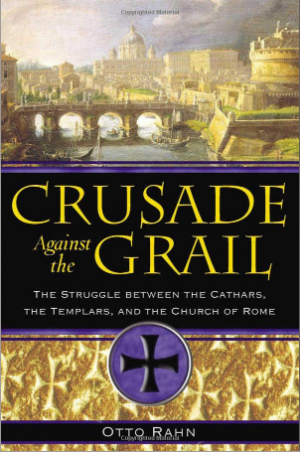Editorial Reviews to First English Translation of Crusade Against the Grail: The Struggle between the Cathars, the Templars, and the Church of Rome

Book Description
The first English translation of the book that reveals the Cathar stronghold at Montségur to be the repository of the Holy Grail<
• Presents the history of the Papal persecution of the Cathars that lies hidden in the medieval epic Parzival and in the poetry of the troubadours
• Provides new insights into the life and death of this gifted and controversial author
Crusade Against the Grail is the daring book that popularized the legend of the Cathars and the Holy Grail. The first edition appeared in Germany in 1933 and drew upon Rahn’s account of his explorations of the Pyrenean caves where the heretical Cathars sect sought refuge during the 13th century. Over the years the book has been translated into many languages and exerted a large influence on such authors as Trevor Ravenscroft and Jean-Michel Angebert, but it has never appeared in English until now.
Much as German archaeologist Heinrich Schliemann used Homer’s Iliad to locate ancient Troy, Rahn believed that Wolfram von Eschenbach’s medieval epic Parzival held the keys to the mysteries of the Cathars and the secret location of the Holy Grail. Rahn saw Parzival not as a work of fiction, but as a historical account of the Cathars and the Knights Templar and their guardianship of the Grail, a “stone from the stars.” The Crusade that the Vatican led against the Cathars became a war pitting Roma (Rome) against Amor (love), in which the Church triumphed with flame and sword over the pure faith of the Cathars.
From the Back Cover
HISTORY / SECRET SOCIETIES
Crusade Against the Grail is the daring book that popularized the legend of the Cathars and the Holy Grail. The first edition appeared in Germany in 1933 and drew upon Rahn’s account of his explorations of the Pyrenean caves where the heretical Cathar sect sought refuge during the thirteenth century. Over the years the book has been translated into many languages and exerted a large influence on such authors as Trevor Ravenscroft and Jean-Michel Angebert, but it has never appeared in English until now.
Much as German archaeologist Heinrich Schliemann used Homer’s Iliad to locate ancient Troy, Rahn believed that Wolfram von Eschenbach’s medieval epic Parzival held the keys to the mysteries of the Cathars and the secret location of the Holy Grail. Rahn saw Parzival not as a work of fiction, but as a historical account of the Cathars and the Knights Templar and their guardianship of the Grail, a “stone from the stars.” The Crusade that the Vatican led against the Cathars became a war pitting Roma (Rome) against Amor (love), in which the Church triumphed with flame and sword over the pure faith of the Cathars.
About the Author
Otto Rahn was born in Michelstadt, Germany, in 1904. After earning his degree in philology in 1924, he traveled extensively to the caves and castles of southern France, researching his belief that the Cathars were the last custodians of the Grail. Induced by Himmler to become a member of the SS as a civilian archaeologist and historian, Rahn quickly grew disillusioned with the direction his country was taking and resigned in 1939. He died, an alleged suicide, on March 13, 1939, in the snows of the Tyrolean Mountains.
- Vous devez vous identifier ou créer un compte pour écrire des commentaires
Termes similaires
|
(English)
|
(English)
|
(English)
|
(English)
|
|
(English)
|
(English)
|
(English)
|
(English)
|









Commentaires récents
il y a 13 années 50 semaines
il y a 13 années 50 semaines
il y a 13 années 50 semaines
il y a 13 années 51 semaines
il y a 14 années 2 semaines
il y a 14 années 7 semaines